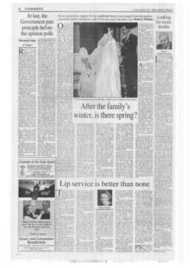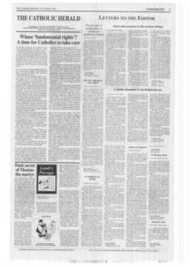Page 4, 20th October 2000
Page 4

Report an error
Noticed an error on this page?If you've noticed an error in this article please click here to report it.
Tags
Share
Related articles
Bishops Upset By Eu Charter
Ratzinger Attacks Eu Rights Charter
Concessions Over Euro Text Fail To Satisfy Church
What Binds The European Union?
Catholics Must Shape Europe, Says Bishop
EU ministers strike out the Church from rights charter
Christianity's role in unifying Europe ignored
By Citra Sldhu EUROPE'S CATHOLIC bishops have expressed "disappointment" at the lack of reference to religious faith in the new Charter of Fundamental Rights.
However, together with John Paul II they have urged heads of state and governments to vote in favour of it having a binding effect, a move fiercely opposed by the British Government.
In a recent audience with participants in the Conference of Presidents of the Parliaments of the European Union, the Pope said that in the creation of the charter, "the union cannot forget that Europe is the cradle of freedom, and a notion of humanity, which was shaped from Christian roots."
He acknowledged the development within the EU of shared institutions "with a system of checks and balances of power, which safeguard democracy" and added: "The time seems right to synthesise these achievements in an arrangement which is both less complex and more effective."
He was speaking, however, before the draft document reached its final form, one which excluded certain amendments requested by the bishops, asking for the protection of human life "from conception to natural death" and recognising the family as "the natural and basic element of society".
A spokesman for Comece, the Commission of the Episcopal Conferences of the European Union, which monitored the drafting stage of the charter, said: "Protecting the funda mental rights of citizens in relation to the European Union and its institutions and agencies is an important initiative to which Comece attaches great value.
"The convention succeeded in drafting a text that integrates for the first time in one document civil, political, economic and social rights."
He added that although questions remained about the method used by the convention, "the transparency and participation of society in its work were a sign of great significance for the decision-making process at EU level."
The bishops' position, believed to be mirrored by a majority of member states, remains at loggerheads with the British government.
in an interview during last weekend's conference in Biarritz, where the charter was approved by 15 member states, Prime Minister Tony Blair dismissed the charter as "purely declaratory" and insisted that it would "not impact on us nationally".
However, the new 54point charter, drawn up by a 62-member convention, is expected to form part of a future EU constitution.
The document goes further than the European Convention on Human Rights, which was incorporated into English and Welsh law just two weeks ago by including references to social policy like the right to strike. Nevertheless, it gives churches as institutions no guarantees whatsoever and faith is held to be a purely private affair.
Felix Leinemann, legal advisor to Comece, said: "One of our proposals was to incorporate into Article 10, the right to freedom of religion, something that would guarantee the religious freedom expressed by the Church in its activities, for example its work in Catholic schools, but this was rejected."
Furthermore, the removal of a reference to Europe's "religious heritage" from a draft preamble was made at the insistence of French Prime Minister Lionel Jospin, who had told the drafting committee that such a reference would infringe on France's status as a "lay state" and "pose a major legal and political obstacle" to the charter's acceptance. The decision to delete the reference was finally made after additional "strong pressure" from Italy and Spain and has been substituted with the phrase "moral and spiritual patrimony".
French Bishop Hippolyte Simon of Clermont-Ferrand called the move a "mistake". He said; "What argument will the state of law have in asking believers to respect it, if it is precisely the state that ignores them'?"
Silvio Marcus-Helmons, also a legal adviser to Comece, said the Church was being forced to keep a "low profile".
He said: "We know a direct reference to God would be hard for memberstates to accept. But if labour unions and political parties are explicitly recognised, why shouldn't churches he ?"
Mr Leinmann said that while the charter had to reflect national legislation, it could in no way influence or extend it. He said: "We were concerned that the charter did not go far enough. Take the issue of bioethics. Although the cloning of human beings has been banned, we would have preferred something that went much further. However, the proposal was rejected because of, among other things, the decision of the British government to allow therapeutic cloning."
Fr Frank Turner, assistant general secretary of the Bishops' Conference of England and Wales, said: "The bishops have been very much in favour of expressing the fundamental human rights in this way.
"But we can't do much about areas we disagree with. I think if the Church finally feels that any clause seriously brings into question Catholic teaching, it will continue to comment on it in that light, but 1 don't think it can outrightly reject the charter as a whole."
Editorial Comment — p7
blog comments powered by Disqus













